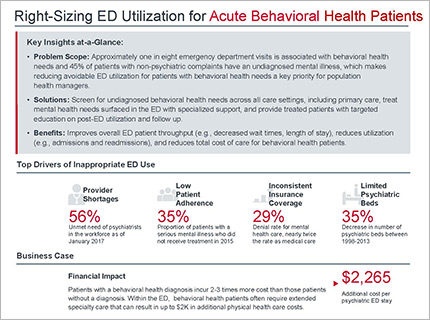Auto logout in seconds.
Continue LogoutFewer than half of black adults in need of mental health care receive treatment—and for those who identify as a "strong black woman," feelings of shame may create an obstacle to needed care, writes Inger Burnett-Zeigler, a clinical psychologist, for the New York Times.
Primer: How to right-size ED utilization for acute behavioral health patients
The mental and physical health of black women
Burnett-Zeigler, the only black woman serving as a clinical psychologist on the faculty of Northwestern University's department of psychiatry, writes, "Many—myself included—wear the badge of Strong Black Woman with honor. We are proud of our tenaciousness and never let the world see us crack." But at the same time, Burnett-Zeigler writes many "are suffering silently with the mental and physical health consequences of carrying the burden of family, work and community responsibilities, compounded by personal experiences of trauma and loss, all in an environment of pervasive racial and gender discrimination."
In comparison to white women, black women are more likely to have post-traumatic stress disorder because of physical violence, sexual abuse, or childhood maltreatment. Black women are also more likely to experience feelings of hopelessness, sadness, and worthlessness, and they are more likely to be depressed and to suffer more severe symptoms that interfere with their abilities to function at home, school, and work. According Burnett-Zeigler, research has also shown black women are more likely to experience stress related to discrimination or racism, employment, family, finances, and safety concerns—which are associated with them living in neighborhoods with high crime.
But instead of receiving therapy, black women find other ways to cope with stress or depression, Burnett-Zeigler writes, such as by drinking, indulging in unhealthy foods, overeating, or spending an excessive amount of time in lying in bed or watching television. According Burnett-Zeigler, "While these behaviors may provide temporary relief, stress and depression can emerge in the form of irritability, anger, physical pain, and chronic illness." For example, she said stress and depression are closely tied to chronic health conditions like diabetes, hypertension, and obesity—which are all conditions more prevalent among black women and culminate in a shorter life expectancy for black women when compared to white women. According Burnett-Zeigler, black women are expected to live to 78 years, while white women are expected to live 81 years.
Why don't more black women seek therapy?
Burnett-Zeigler said black women face several barrier to mental health care. "Shame," she writes, serves as a "key barrier" to mental health care access for black women, who may feel it does not align with the cultural icon of the "Strong Black Woman."
Burnett-Zeigler explains, "Traditionally, black women have garnered strength from God. ... However, the black church has not always condoned secular mental health care, and churchgoers may feel that their faith is called into question if they seek extra help."
Another barrier to mental health services for black women, according to Burnett-Zeigler, is the limited number of black psychologists, psychiatrists, and social workers. She said black women often prefer to have a black mental health provider, but there are few available. Particularly in low-income communities, the available of mental health services is scarce and waiting lists for such services are long.
Cost is a barrier as well, Burnett-Zeigler writes. She notes that more than 16% of black women do not have health insurance, and many cannot afford to receive mental health care treatment.
A shift in awareness
Burnett-Zeigler explains that in recent years there has "been a shift" in attitudes toward mental health care for black women as groups, such as Black Girl in Om and GirlTrek, raise "awareness about the importance of self-care and providing outlets for living a healthy lifestyle."
Burnett-Zeigler writes, "The singular narrative of what it means to be a Strong Black Woman" needs to be let go. She said, "Black women have harnessed their strength out of the necessity to support themselves and their families when no one else would—and that should be applauded. But there is also strength in vulnerability, comfort in seeing that you are not alone and power in knowing when to ask for help" (Burnett-Zeigler, New York Times, 4/25).
Primer: How to right-size ED utilization for acute behavioral health patients
This primer features two in-depth case studies of organizations that formed focused partnerships to provide post-discharge support and wrap around psychosocial services to address the needs of this frequent ED user group.
Don't miss out on the latest Advisory Board insights
Create your free account to access 1 resource, including the latest research and webinars.
Want access without creating an account?
You have 1 free members-only resource remaining this month.
1 free members-only resources remaining
1 free members-only resources remaining
You've reached your limit of free insights
Become a member to access all of Advisory Board's resources, events, and experts
Never miss out on the latest innovative health care content tailored to you.
Benefits include:
You've reached your limit of free insights
Become a member to access all of Advisory Board's resources, events, and experts
Never miss out on the latest innovative health care content tailored to you.
Benefits include:
This content is available through your Curated Research partnership with Advisory Board. Click on ‘view this resource’ to read the full piece
Email ask@advisory.com to learn more
Click on ‘Become a Member’ to learn about the benefits of a Full-Access partnership with Advisory Board
Never miss out on the latest innovative health care content tailored to you.
Benefits Include:
This is for members only. Learn more.
Click on ‘Become a Member’ to learn about the benefits of a Full-Access partnership with Advisory Board
Never miss out on the latest innovative health care content tailored to you.

